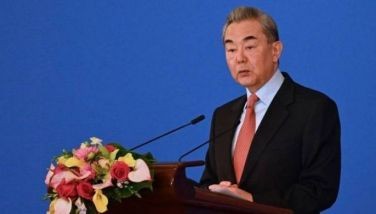Taiwan urges China to engage in dialogue over cross-straits issue
March 19, 2006 | 12:00am
Taiwan urged China yesterday to engage in a dialogue with Taiwanese leaders to reduce tensions arising from the cross-straits issue amid Taipei’s bid for independence.
The Taipei Economic and Cultural Office (TECO) called for talks in a statement after Beijing openly called on the Philippines and the international community to oppose and stop Taiwanese President Chen Shui-bien from what it claimed was a very dangerous move: separating Taiwan from mainland China.
Taipei, however, assured "it has no intention to change the status quo across the Taiwan Strait provided that Taiwan and its people’s security and well-being will not be threatened and damaged."
"President Chen has reiterated that the two sides of the Taiwan Strait should sit down and talk on an equal-footing and dignity basis. We urge Beijing leaders to change their mindset and take concrete steps to dialogue with Taipei leaders for the (good) of all people (affected in the Taiwan Strait) and peace in East Asia," the TECO statement said.
Taipei pointed out that it has been an independent and sovereign state since 1912.
"After the civil war in 1949, Taiwan and PRC are separate and do not have jurisdiction over each other. Taiwan is not a part of the PRC (People’s Republic of China). This status quo has existed more than half a century," the statement said.
The Taiwanese president has scrapped the National Unification Council and guidelines for unification. Taipei noted that the National Unification Council was not formed based on existing laws while the National Unification Guidelines were just contingent administrative measures adopted by the KMT, the long-time party in power before 2000.
"Since 2000, the Taiwan government has extended more than 40 olive branches of peace to PRC. The 23 million people of Taiwan have long held the belief of goodwill reconciliation, proactive cooperation and permanent peace. It is also our sincere hope of opening the window of opportunity for cross-strait dialogue and reconciliation," TECO said.
"However, China uses its long-held condition of acceptance by Taiwan of its ‘One China’ policy and 1992 Consensus to block dialogue and consultation with Taiwan government," TECO said.
In addition, it said that China had purposely strengthened its interaction with Taiwan’s opposition parties to deliberately negate the people-elected Taiwanese government and treat Taiwan as its governed province.
China’s renegade province also pointed out that Beijing keeps increasing its ballistic missile deployment targeting Taiwan and threatening its 23 million people along its southeast coast. It added the number of missiles was 300 in 2001 and at present is more than 800.
Taipei also claimed that China had assembled its "three-stage preparation for war" against Taiwan, setting the following goals as its interim objectives: establish contingency-response combat capabilities by 2007; build up combat capabilities for large-scale military engagement by 2010; and ensure victory in a decisive battle by 2015.
The Taipei Economic and Cultural Office (TECO) called for talks in a statement after Beijing openly called on the Philippines and the international community to oppose and stop Taiwanese President Chen Shui-bien from what it claimed was a very dangerous move: separating Taiwan from mainland China.
Taipei, however, assured "it has no intention to change the status quo across the Taiwan Strait provided that Taiwan and its people’s security and well-being will not be threatened and damaged."
"President Chen has reiterated that the two sides of the Taiwan Strait should sit down and talk on an equal-footing and dignity basis. We urge Beijing leaders to change their mindset and take concrete steps to dialogue with Taipei leaders for the (good) of all people (affected in the Taiwan Strait) and peace in East Asia," the TECO statement said.
Taipei pointed out that it has been an independent and sovereign state since 1912.
"After the civil war in 1949, Taiwan and PRC are separate and do not have jurisdiction over each other. Taiwan is not a part of the PRC (People’s Republic of China). This status quo has existed more than half a century," the statement said.
The Taiwanese president has scrapped the National Unification Council and guidelines for unification. Taipei noted that the National Unification Council was not formed based on existing laws while the National Unification Guidelines were just contingent administrative measures adopted by the KMT, the long-time party in power before 2000.
"Since 2000, the Taiwan government has extended more than 40 olive branches of peace to PRC. The 23 million people of Taiwan have long held the belief of goodwill reconciliation, proactive cooperation and permanent peace. It is also our sincere hope of opening the window of opportunity for cross-strait dialogue and reconciliation," TECO said.
"However, China uses its long-held condition of acceptance by Taiwan of its ‘One China’ policy and 1992 Consensus to block dialogue and consultation with Taiwan government," TECO said.
In addition, it said that China had purposely strengthened its interaction with Taiwan’s opposition parties to deliberately negate the people-elected Taiwanese government and treat Taiwan as its governed province.
China’s renegade province also pointed out that Beijing keeps increasing its ballistic missile deployment targeting Taiwan and threatening its 23 million people along its southeast coast. It added the number of missiles was 300 in 2001 and at present is more than 800.
Taipei also claimed that China had assembled its "three-stage preparation for war" against Taiwan, setting the following goals as its interim objectives: establish contingency-response combat capabilities by 2007; build up combat capabilities for large-scale military engagement by 2010; and ensure victory in a decisive battle by 2015.
BrandSpace Articles
<
>
- Latest
- Trending
Trending
Latest




























